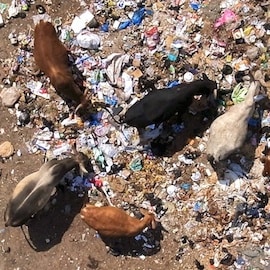Social Business Roundup: Building Our Immunity to Anti-Vaxxers, Solar Loans With a Side of Health, and SRI Goes Robo
It’s fair to say there’s a crisis of trust in the world. Some of it’s well earned. (Did you hear what those Volkswagen executives tried to pull?) Some of it’s not. Like the recent skepticism surrounding a global health solution that saves 6 million lives every year.
There have long been people who, despite the lack of any evidence, claim that vaccines are dangerous – that they cause autism, for instance. Scientists have been busy trying to beat back the scaremongering with logic and facts.
The stakes just got higher. Robert F. Kennedy Jr. emerged from a meeting with Donald Trump this week and said the president-elect asked him to chair a commission “on vaccine safety and scientific integrity.” Trump’s team later clarified that they were merely “exploring the possibility” of such a commission. The takeaway: The next president of the United States is not convinced vaccines are safe. And last week, Dr. Daniel Neides, the medical director of the Wellness Institute at the esteemed Cleveland Clinic, decided to “stand up and scream” via a column on Cleveland.com that “newborns without intact immune systems and detoxification systems are being over-burdened with PRESERVATIVES AND ADJUVANTS IN THE VACCINES.” (The capitalizations are from the original.) He later apologized, sort of, and the clinic said he’d be disciplined. But the damage was done. Trump, Kennedy and Neides gave new life, and a higher profile, to anti-vaxxers.
They enjoy the luxury of continuing this “debate” because they live in a country where most preventable diseases were long ago eliminated. By vaccines. If they lived in a country where Ebola or measles or mumps or rubella were killing people and ruining communities, they’d understand the value of vaccines and the lunacy of lending credibility to those who literally oppose the prevention of diseases.
Most of the 6 million lives saved every year from vaccines are in developing countries. Public officials there don’t debate the value of vaccines, only scramble to get more. And citizens there aren’t nearly as skeptical; their trust in institutions, it turns out, is higher (by 12 points) than in the developed world. But that trust will erode, says Richard Edelman, “as economic growth slows and corruption is revealed. Severe drops can be expected in Brazil, China, Indonesia and Mexico.”
For better or worse, the developing world often takes its cues from the developed world. And the last thing the Global South needs is the distraction of debating whether it should pursue proven life-saving interventions.
If 2016 taught us anything, it’s that fringe thoughts can quickly be brought into the mainstream. In other words, global health proponents can’t afford to take the vaccine debate for granted.
-Kyle Popin
Solar Loans, Charged with Health Insurance
PEG Africa, a pay-as-you-go solar products financing firm in West Africa, says health care emergencies are one of the biggest reasons why their customers fail to repay their loans.
This reality prompted the Accra-based PEG to partner with microinsurance provider BIMA and Prudential Life to provide free health insurance to eligible customers as a reward for loyalty and timely loan repayment. The insurance, underwritten by Prudential Life, pays out for every night spent in hospital in the event a customer is injured or falls ill and needs hospitalization.
PEG provides 12-month rent-to-own financing for solar products to customers who generally earn between $5-$10 a month. Most customers are charged 50 cents a day on their loans, according to the company.
PEG and BIMA say they successfully pilot tested the insurance product with 2,000 families in Ghana and will now launch it nationwide.
(Note: Find out more about the announcement here. We had additional questions about the plan, but emails were not immediately returned by publication time.)
SRI Goes Robo
The robo-advisor trend in investment management has officially gone mainstream. In the past year, major players like BlackRock, E-Trade and Fidelity joined pioneering startups like Betterment and Wealthfront (and early entrants like Vanguard and Schwab) in the automated investment services market. More big names are planning to join them this year.
The trend is already reshaping the investing world. Though the robo-advisor industry manages only about $30 billion now, analysts predict that number will grow to some $2 trillion to $8 trillion by 2020. The reasons? Managing investments through algorithms costs far less than using a human financial advisor, mobile interfaces make the process fast and convenient, and the services accept investors with small minimum balances that wouldn’t be profitable to traditional advisors.
According to an Investment News article this week, we can add another reason to this list: a growing number of robo-advisors are filling a void left by their human counterparts by offering socially responsible investing choices. “Several automated advice platforms have been created recently to pair one’s values with their investments, and it’s likely only a matter of time before many of the largest digital advice platforms include an SRI component as well,” the article explains, pointing to platforms like OpenInvest, Earthfolio and Grow Invest as examples. The emergence of “robo-SRI,” for lack of a better term, seems to be driven by customer frustration at the lack of socially responsible options among traditional investment managers. “We’re constantly meeting people who asked their adviser about socially responsible investing, but they didn’t know about it or said they don’t recommend it,” said Joshua Levin, co-founder of OpenInvest.
Each of the firms mentioned in the article started up within the past 18 months, and though none disclosed details on their number of investors, they all report to be growing. With intuitive apps, fees ranging from .25 to .5 percent and minimum balances from $1 to $25,000, they seem likely to appeal to a broad range of clients – particularly the ever-important millennial market. If they can scale enough to make their low-fee model profitable – and convince enough people to trust them with their retirement savings – robo-SRI startups could provide a valuable boost to the social investing movement. Now all the emerging trend needs is a catchy name. “SRI-NET”? Maybe not.
Internet for Development: Don’t Believe the Hype
It’s tempting to believe that when government and private enterprise team up to extend affordable internet, economic equality automatically gets a high-speed push forward. Nicolas Friederici, who researches digital economies at the University of Oxford, actually decided to test that conclusion, and found the hype doesn’t live up to the reality.
Friederici writes in The Conversation that his research group looked at the ICT policies of six countries in Africa and 13 reports chronicling ICT by business and development groups.
Researchers limited their analysis to the internet’s impact on economic growth and inequality. They found a wide gap between the promise of digital technologies and its collective ability to leapfrog African consumers toward connectivity.
“We are not arguing that the internet is unimportant for development,” Friederici writes. “Instead, we encourage a more nuanced view that acknowledges that the diffusion of internet connectivity comes with risks and unintended consequences. While value creation is globalised, value extraction often remains concentrated in the Global North.”
His paper, The Impact of Connectivity in Africa: Grand Visions and the Mirage of Inclusive Digital Development, goes deeper.
Recognizing Enterprising NGOs
NGO Advisor this week published its rankings of the Top 500 non-governmental organizations and six of the top 10 spend a lot of time working to develop social enterprises. The NGOs were judged along three main criteria: impact, innovation and governance.
The top 10 are included below. Those in bold have strong ties to enterprise development.
- BRAC
- Doctors Without Borders
- Skoll Foundation
- Danish Refugee Council
- Ashoka
-
Mercy Corps
- Oxfam
- Landesa
- Handicap International
- Acumen
Photo credit: Partha S. Sahana, via Flickr.
- Categories
- Energy, Health Care, Investing, Social Enterprise, Technology



